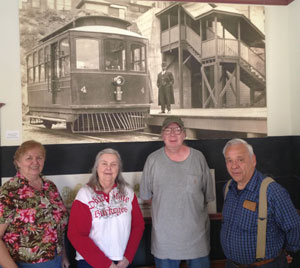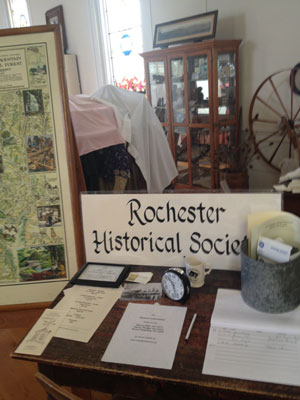
Members of the Bethel Historical Society
I remember as a young boy growing up and being fascinated by the local history of my home town. I wanted to understand how and why certain things came to be the way they are now. Why were there abandoned iron mines on the hillside and stone walls cutting through the forest behind my house? What was once shipped on the now abandoned railbed? How did Ghost Pony Road get its name? And who is the old man who from an early age I remember sitting in a lawn chair waving at passing traffic? I found the answers at my local library in a book that had been put together by the local historical society. While the historical society itself was only open a few times a month, the book offered all the maps, stories, and documents I could dream of, and most importantly, it gave me a sense of what my community was all about. Searching for a book with the answers was my first thought, but the first place someone growing up or looking to move to a community today would turn to is probably the internet.
Over the past few weeks, I have had the opportunity to meet one-on-one with the Historical Societies of Bethel and Rochester as well as the Black River Academy Museum in Ludlow. In each case, I’ve found amazing displays of local collections and, perhaps even more inspiring, passionate individuals who want to share the story of their communities to a younger generation. In every museum, the curators of the historical societies were intent on learning about how to back up their museum collections online and how to use social media to tell their story. As the nonprofit advisor for the Vermont Digital Economy Project, I will be working with historical societies to do just that.
The chance to learn Facebook through the one-on-one advising the Vermont Digital Economy Project is offering nonprofits was an invaluable opportunity for us to learn to reach out to a younger generation.” said Anita Alic, Vice President of the Black River Academy Museum in Ludlow, Vermont, “It had become increasingly apparent that the Black River Academy Museum needed to attract younger members and to do so, the museum needs to be up-to-date with all the new media now available.”

At the Rochester Historical Society
In addition to helping local historical societies with Facebook and possibly Pinterest, I will also be working with them to get their collections online and to harness the skills of a younger generation to improve their collections and teach students about the importance of history. Early ideas include recruiting students to go out in the community and record oral histories from local residents that can then be uploaded to the historical society’s website and shared on Facebook. These volunteers could also help with photographing, cataloguing, and uploading each museum’s collection to the web. Together these online and offline techniques will assist historical societies to open up the history of their communities to a new generation.
The Roman philosopher Marcus Tullius Cicero said, “History is the witness that testifies to the passing of time; it illuminates reality; vitalizes memory; provides guidance in daily life and brings us tidings of antiquity.” In a state so rich in history and sense of place as Vermont, making that history accessible to all Vermonters and available at the click of mouse is a worthy goal. I will be sending a membership check to my local historical society and attempting to visit next time I am in the area. I suggest you do the same.
